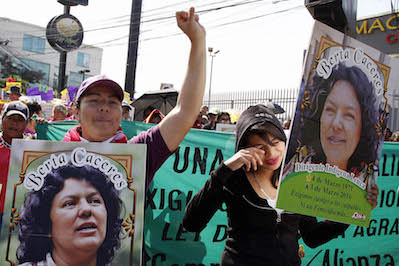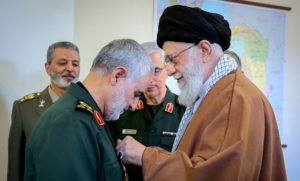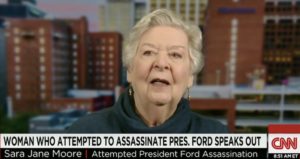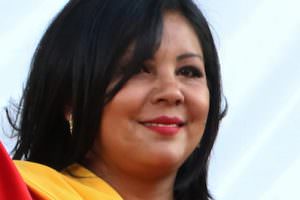Truthdigger of the Week: Berta Cáceres, Slain Champion of Human Rights and the Earth
In Honduras, the deadliest country for environmentalists, the indigenous leader fought tirelessly for her people and their land. Her murder must not go unpunished. Women in Tegucigalpa, Honduras, carry images of slain environmental activist Berta Cáceres on International Women's Day on Tuesday. (Fernando Antonio / AP)
Women in Tegucigalpa, Honduras, carry images of slain environmental activist Berta Cáceres on International Women's Day on Tuesday. (Fernando Antonio / AP)
Every week the Truthdig editorial staff selects a Truthdigger of the Week, a group or person worthy of recognition for speaking truth to power, breaking the story or blowing the whistle. It is not a lifetime achievement award. Rather, we’re looking for newsmakers whose actions in a given week are worth celebrating.
In a country deemed just last year the most dangerous in the world for environmentalists, Honduran activist Berta Cáceres knew she would not live a long life. After the indigenous leader was murdered by gunmen in her home in Honduras on March 3, her nephew Silvio Carrillo told The Guardian, “I think she would have rather died while in a protest but these cowards took her unawares. She knew this was going to happen. She had prepared for it.”
In the face of numerous threats to her well-being, Cáceres continued her lifelong struggle to protect human rights, heading the Council of Indigenous Peoples of Honduras (COPINH) and leading environmental campaigns such as the fight to keep a potentially destructive dam from being built on the Gualcarque River. For her efforts to thwart the hydroelectric project, the activist won the 2015 Goldman Environmental Prize, an award considered by many to be the Nobel Prize of environmentalism.
As a Lenca community leader, she championed indigenous rights and dedicated herself to reforming Honduras’ systemic corruption, helping democratically elected President Manuel Zelaya until he was ousted in a 2009 coup, which the Obama administration did nothing to condemn.
Asked by “Democracy Now!” host Amy Goodman what his aunt was “trying to do in her life,” Carrillo said, “She was trying to be a mother, be a daughter, be an aunt, be a human being, respect human beings. And this is what she did every day for the indigenous people of Honduras and across Latin America.”
In the same program, Cáceres’ longtime friend Beverly Bell delivered a powerful description of the activist’s work:
There’s no way to overstate the importance of Berta’s work. She was working very closely, actually, with the democratically elected President Mel Zelaya to work to, quote, “refound” democracy. And she was doing this in the same way that Berta did everything, which was through grassroots mobilization of workers, of women, of, significantly, indigenous people and campesinos, which is the population that was represented in the organization that she founded some 20 years ago. She was working for a wholly new form of governance in Honduras, not just a new government, but a new system whereby people had the say and the riches of the country went to benefit them instead of the tiny elite. … Berta continued to work for that change for true participatory democracy that empowered women, that empowered LGBQ individuals, that empowered those who have always been left on the margins, excluded from political processes and from economic benefits.
The handling of the investigation into Cáceres death, which is widely viewed as a targeted assassination, has inspired protests across South America. The only eyewitness to the crime, Mexican activist Gustavo Castro Soto—who survived by pretending he’d been killed by the bullets that wounded him—has been held for questioning by Honduran authorities. There is growing concern in the activist community that his life is in danger.
Commenting on Cáceres’ assassination, an article in The Hill invoked a fitting quote, words that Martin Luther King Jr. spoke at the funeral for civil rights worker James Reeb in 1965: “[We] must be concerned not merely about who murdered him, but about the system, the way of life, the philosophy which produced the murder.” The article — written by Robin Broad, John Cavanagh and Joe Eldridge — blames a “culture of impunity” and the “long tragic history of misguided U.S. policy that has pursued expediency above principle,” sending a message that “the United States is an unreliable defender of democracy and human rights.” The article went on to demand that the U.S. government rise to the occasion and seek answers to Cáceres’ assassination.
The Obama administration, which shamefully capitulated to the Honduran coup, now has an opportunity to stand decisively against chronic impunity in Honduras. Members of Congress and Secretary of State John Kerry (to whom over 200 organizations have written) have a moral and political obligation to speak forcefully and insist on an unflinching inquiry into the murder of Cáceres and the safe and prompt return of [Gustavo] Castro to his home country. All U.S. assistance to the military and security forces—except for investigative and forensic support—should be halted until the perpetrators are found and prosecuted, and until the shameful legacy of impunity can be effectively addressed.
Until there is justice for Berta Cáceres, there can be no justice for the long-suffering people of Honduras. Washington is poised to play a key role in making that happen.
Cáceres risked and ultimately lost her life to make this earth a better home for all its children and to save it from the greed and corruption that is systematically destroying the environment. Her death—on the day before her 45th birthday—is a reminder to others to continue her life’s work by fighting for justice through peaceful protests and grass-roots movements, beginning with a unified demand that the crime not go unpunished.
For embodying the type of heroism required to protect and sustain underprivileged communities and this savaged earth, the late Berta Cáceres is our Truthdigger of the Week.
Independent journalism is under threat and overshadowed by heavily funded mainstream media.
You can help level the playing field. Become a member.
Your tax-deductible contribution keeps us digging beneath the headlines to give you thought-provoking, investigative reporting and analysis that unearths what's really happening- without compromise.
Give today to support our courageous, independent journalists.








You need to be a supporter to comment.
There are currently no responses to this article.
Be the first to respond.